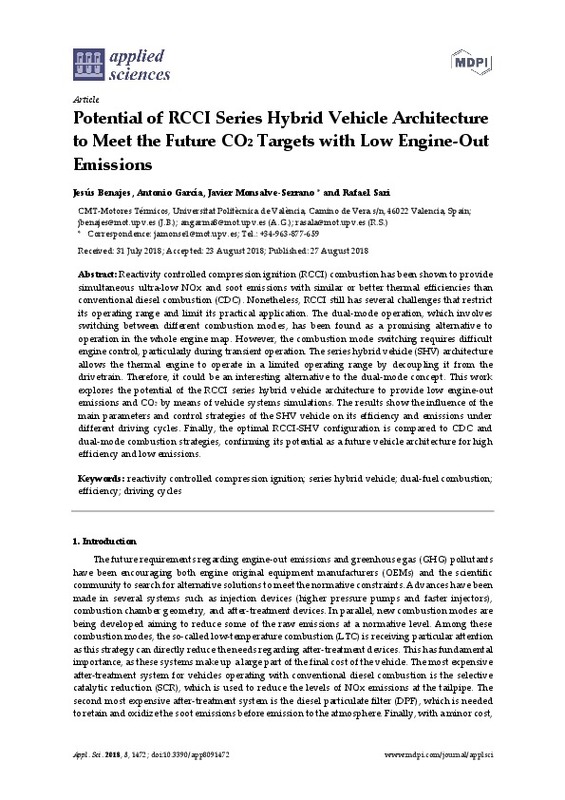JavaScript is disabled for your browser. Some features of this site may not work without it.
Buscar en RiuNet
Listar
Mi cuenta
Estadísticas
Ayuda RiuNet
Admin. UPV
Potential of RCCI Series Hybrid Vehicle Architecture to Meet the Future CO2 Targets with Low Engine-Out Emissions
Mostrar el registro sencillo del ítem
Ficheros en el ítem
| dc.contributor.author | Benajes, Jesús
|
es_ES |
| dc.contributor.author | García Martínez, Antonio
|
es_ES |
| dc.contributor.author | Monsalve-Serrano, Javier
|
es_ES |
| dc.contributor.author | Lago-Sari, Rafael
|
es_ES |
| dc.date.accessioned | 2019-06-21T20:03:11Z | |
| dc.date.available | 2019-06-21T20:03:11Z | |
| dc.date.issued | 2018 | es_ES |
| dc.identifier.uri | http://hdl.handle.net/10251/122515 | |
| dc.description.abstract | [EN] Reactivity controlled compression ignition (RCCI) combustion has been shown to provide simultaneous ultra-low NOx and soot emissions with similar or better thermal efficiencies than conventional diesel combustion (CDC). Nonetheless, RCCI still has several challenges that restrict its operating range and limit its practical application. The dual-mode operation, which involves switching between different combustion modes, has been found as a promising alternative to operation in the whole engine map. However, the combustion mode switching requires difficult engine control, particularly during transient operation. The series hybrid vehicle (SHV) architecture allows the thermal engine to operate in a limited operating range by decoupling it from the drivetrain. Therefore, it could be an interesting alternative to the dual-mode concept. This work explores the potential of the RCCI series hybrid vehicle architecture to provide low engine-out emissions and CO2 by means of vehicle systems simulations. The results show the influence of the main parameters and control strategies of the SHV vehicle on its efficiency and emissions under different driving cycles. Finally, the optimal RCCI-SHV configuration is compared to CDC and dual-mode combustion strategies, confirming its potential as a future vehicle architecture for high efficiency and low emissions. | es_ES |
| dc.description.sponsorship | This research was funded by FEDER and Spanish Ministerio de Economia y Competitividad through the TRANCO project, with grant number TRA2017-87694-R. | es_ES |
| dc.language | Inglés | es_ES |
| dc.publisher | MDPI AG | es_ES |
| dc.relation.ispartof | Applied Sciences (Basel) | es_ES |
| dc.rights | Reconocimiento (by) | es_ES |
| dc.subject | Reactivity controlled compression ignition | es_ES |
| dc.subject | Series hybrid vehicle | es_ES |
| dc.subject | Dual-fuel combustion | es_ES |
| dc.subject | Efficiency | es_ES |
| dc.subject | Driving cycles | es_ES |
| dc.subject.classification | MAQUINAS Y MOTORES TERMICOS | es_ES |
| dc.title | Potential of RCCI Series Hybrid Vehicle Architecture to Meet the Future CO2 Targets with Low Engine-Out Emissions | es_ES |
| dc.type | Artículo | es_ES |
| dc.identifier.doi | 10.3390/app8091472 | es_ES |
| dc.relation.projectID | info:eu-repo/grantAgreement/AEI/Plan Estatal de Investigación Científica y Técnica y de Innovación 2013-2016/TRA2017-87694-R/ES/REDUCCION DE CO2 EN EL TRANSPORTE MEDIANTE LA INYECCION DIRECTA DUAL-FUEL DE BIOCOMBUSTIBLES DE SEGUNDA GENERACION/ | es_ES |
| dc.rights.accessRights | Abierto | es_ES |
| dc.contributor.affiliation | Universitat Politècnica de València. Departamento de Máquinas y Motores Térmicos - Departament de Màquines i Motors Tèrmics | es_ES |
| dc.description.bibliographicCitation | Benajes, J.; García Martínez, A.; Monsalve-Serrano, J.; Lago-Sari, R. (2018). Potential of RCCI Series Hybrid Vehicle Architecture to Meet the Future CO2 Targets with Low Engine-Out Emissions. Applied Sciences (Basel). 8(9):1-19. https://doi.org/10.3390/app8091472 | es_ES |
| dc.description.accrualMethod | S | es_ES |
| dc.relation.publisherversion | http://doi.org/10.3390/app8091472 | es_ES |
| dc.description.upvformatpinicio | 1 | es_ES |
| dc.description.upvformatpfin | 19 | es_ES |
| dc.type.version | info:eu-repo/semantics/publishedVersion | es_ES |
| dc.description.volume | 8 | es_ES |
| dc.description.issue | 9 | es_ES |
| dc.identifier.eissn | 2076-3417 | es_ES |
| dc.relation.pasarela | S\367463 | es_ES |
| dc.contributor.funder | Agencia Estatal de Investigación | es_ES |








